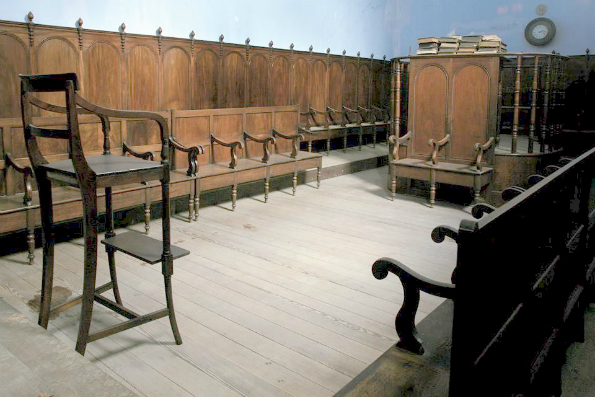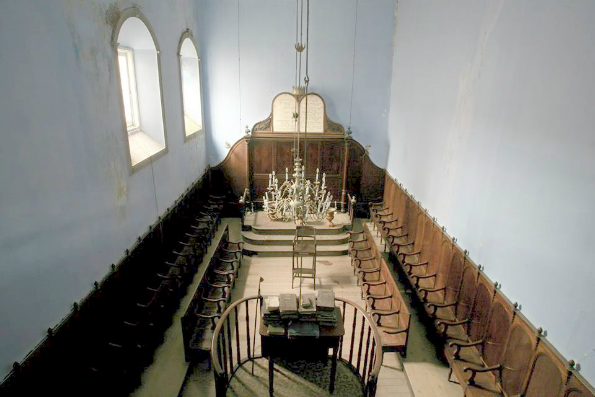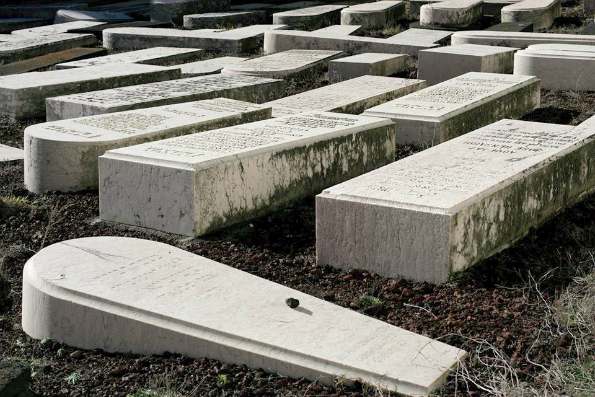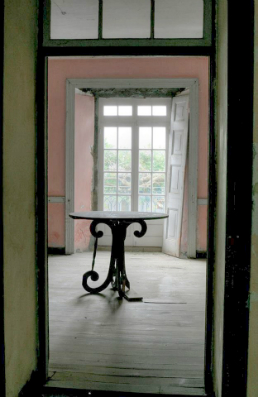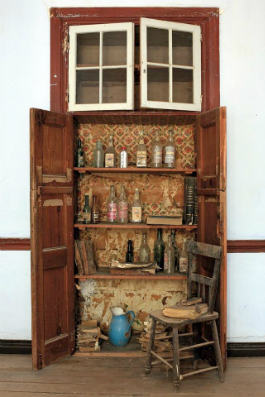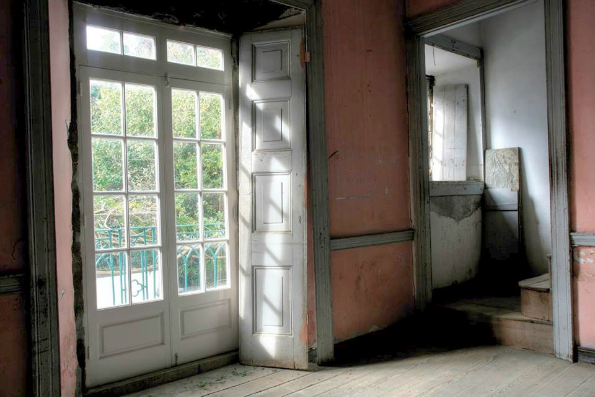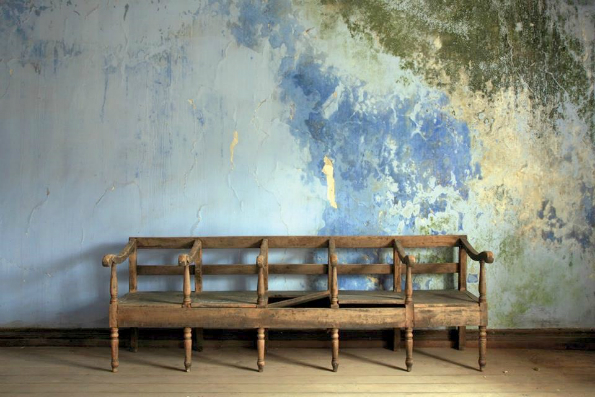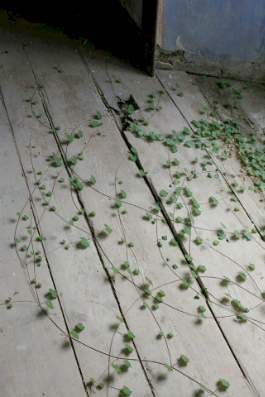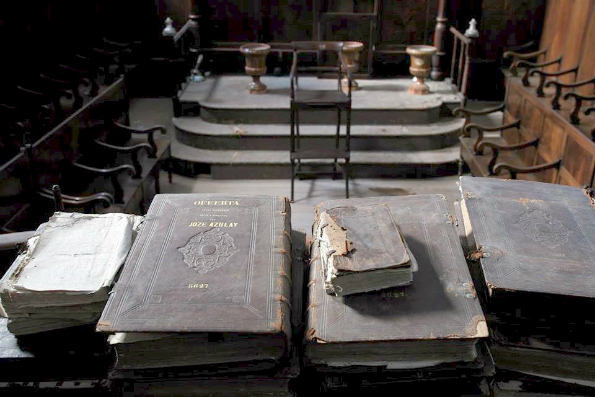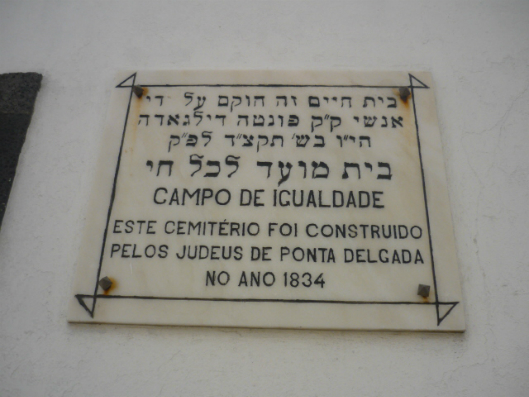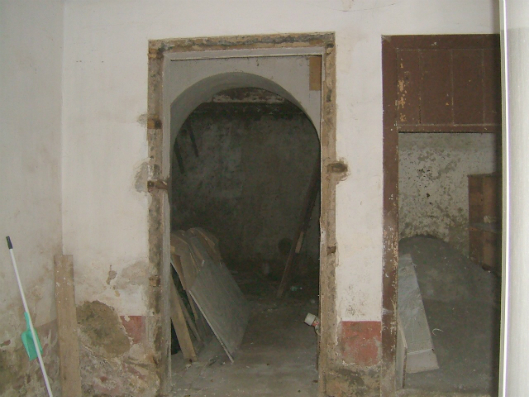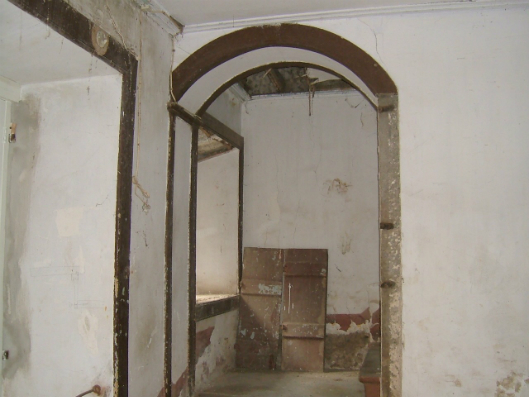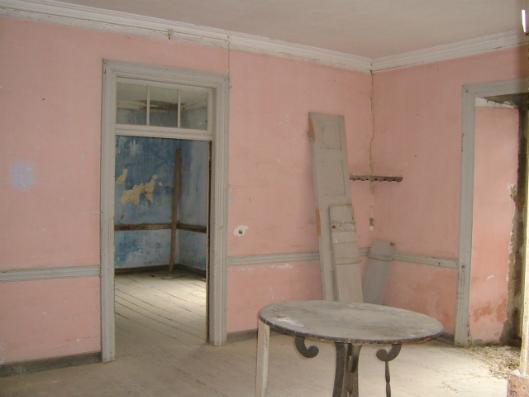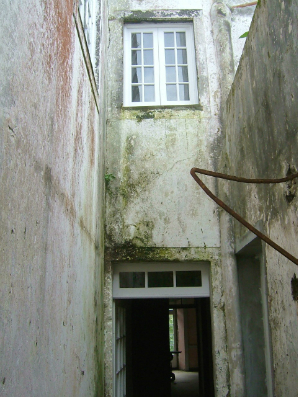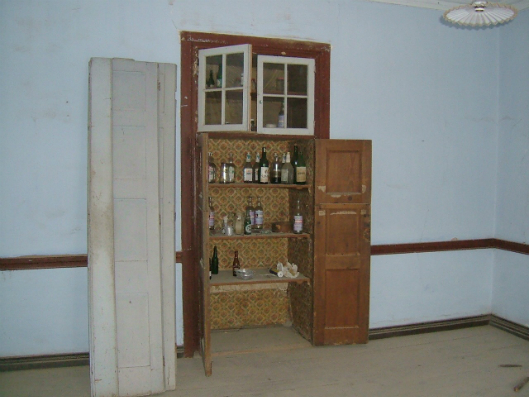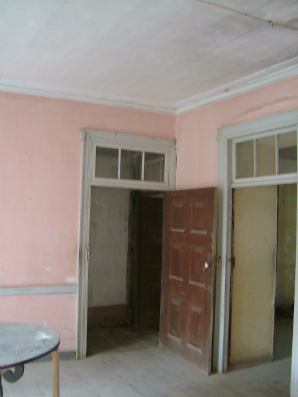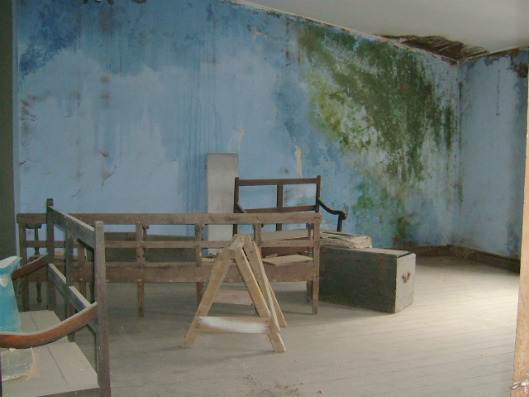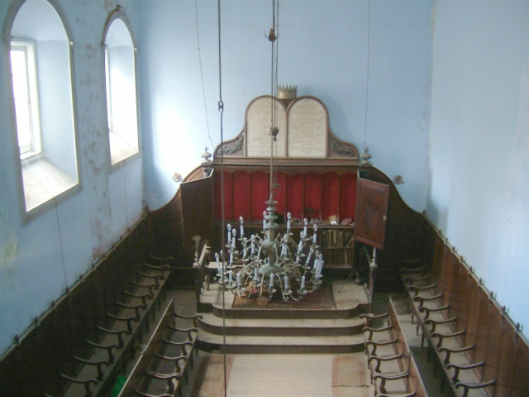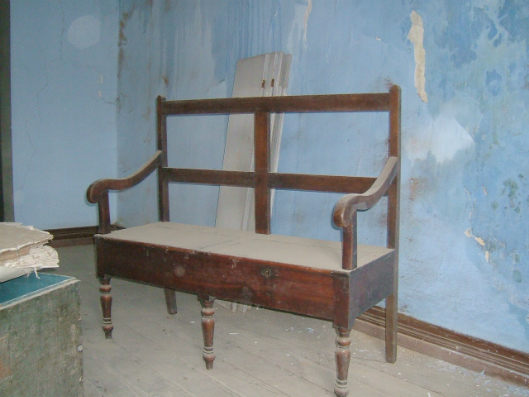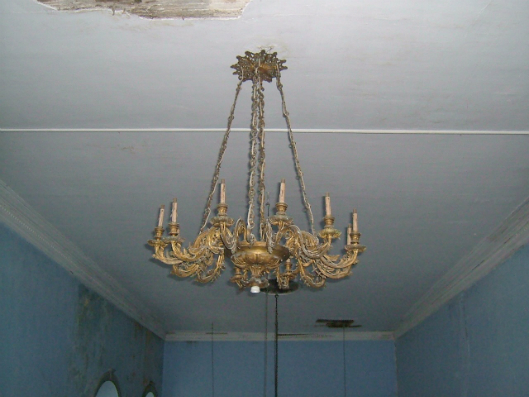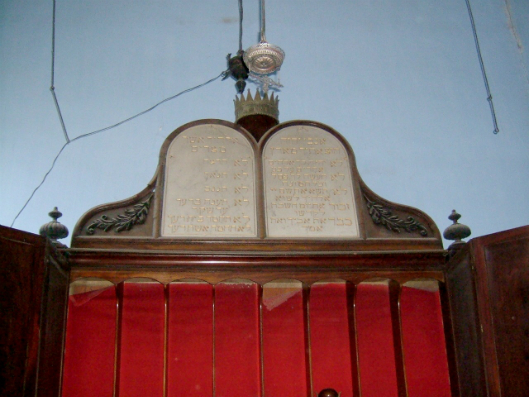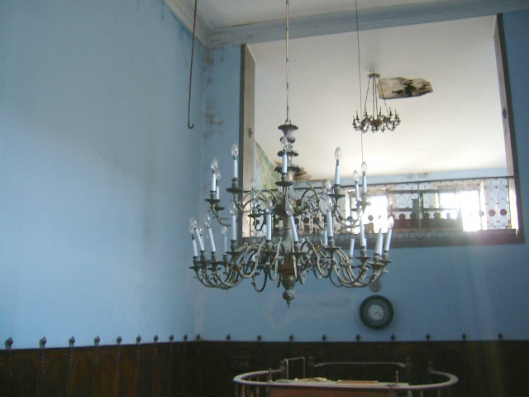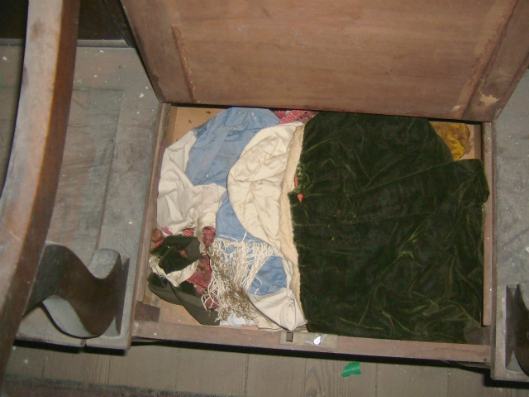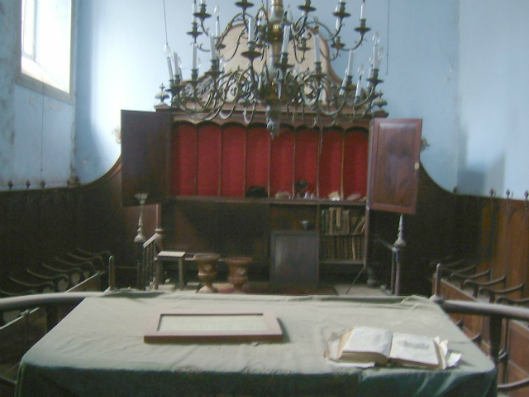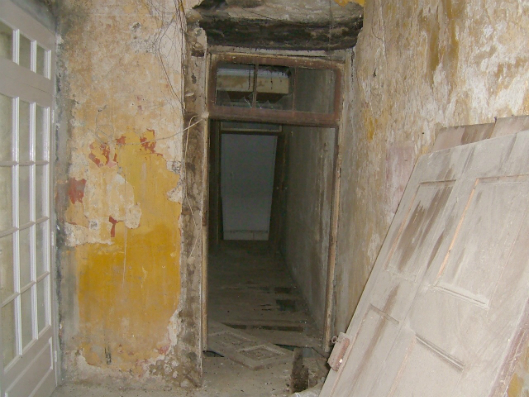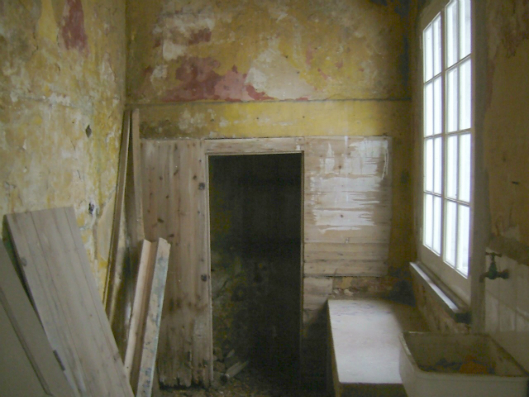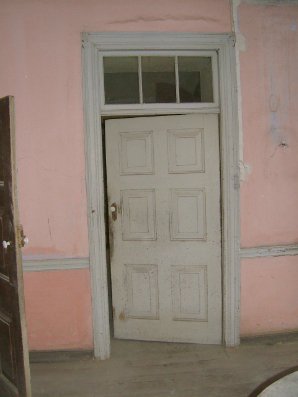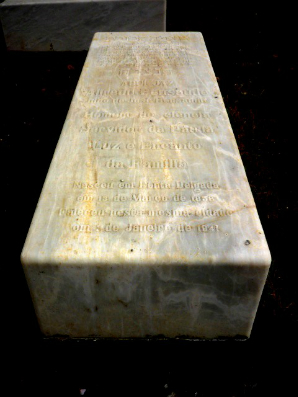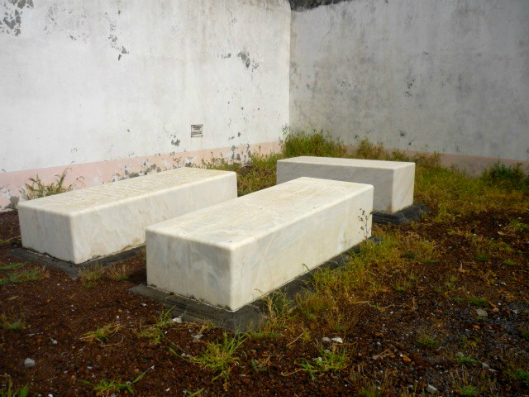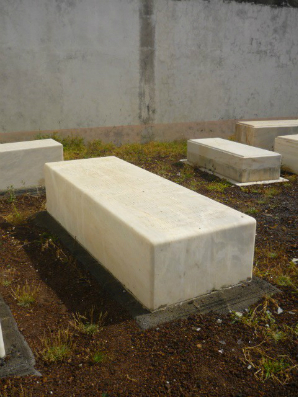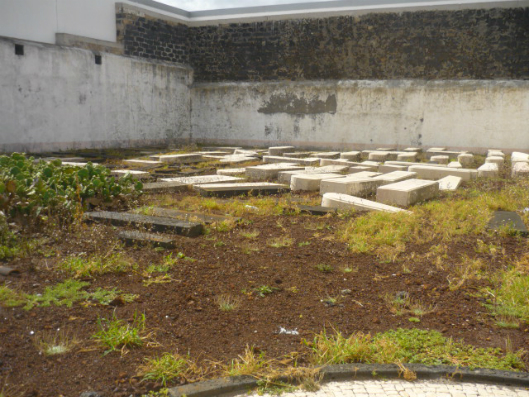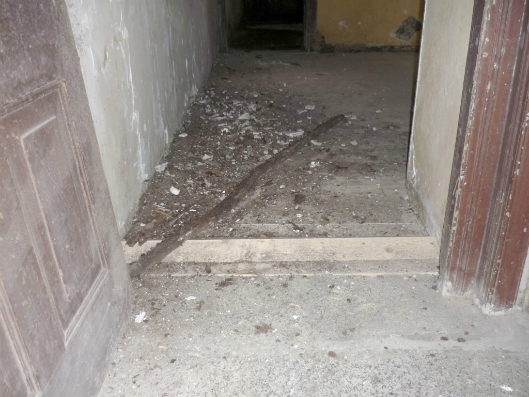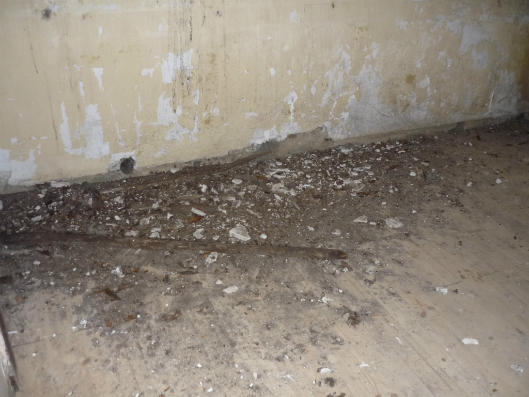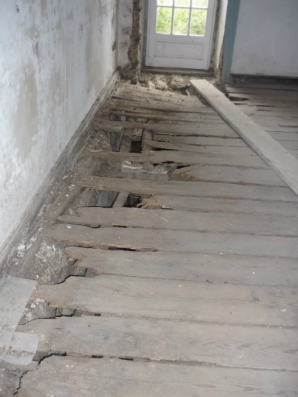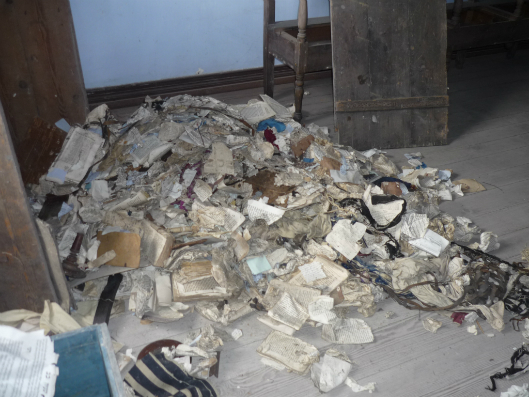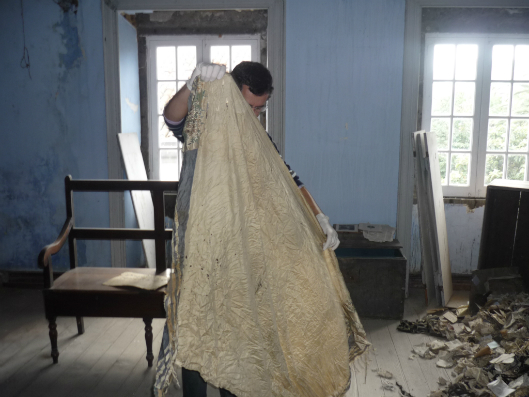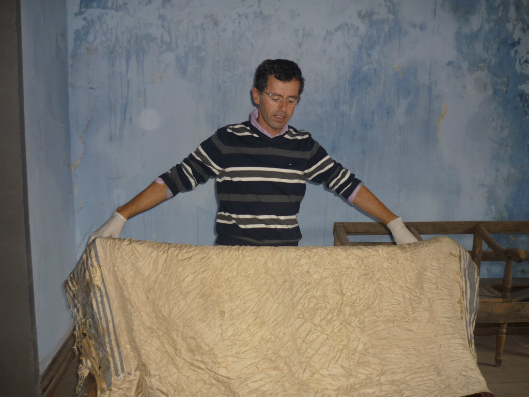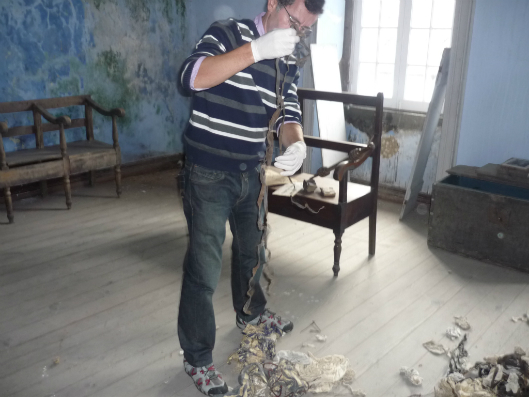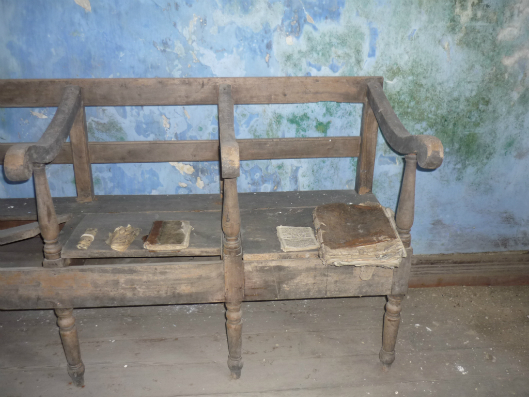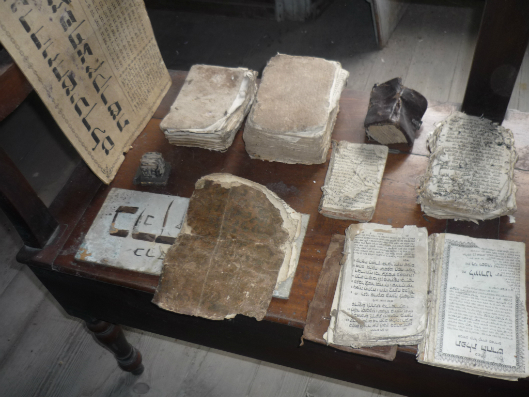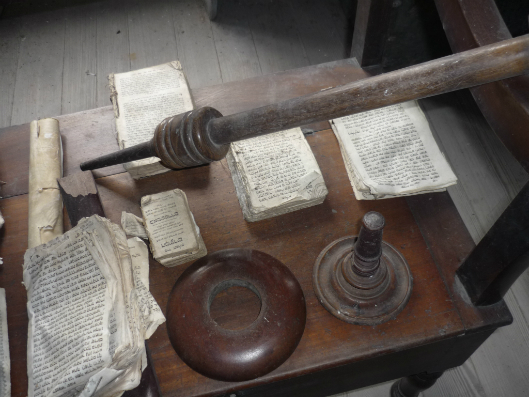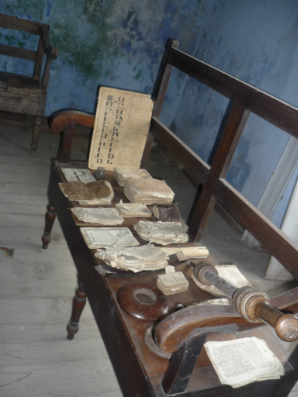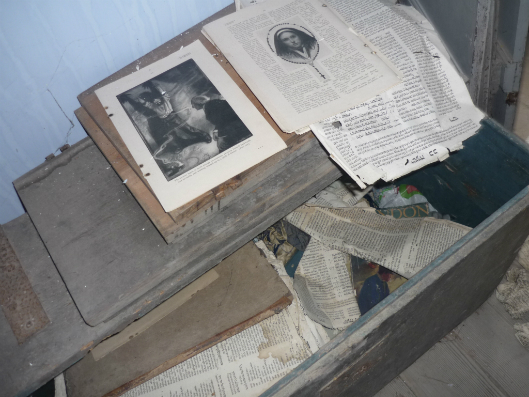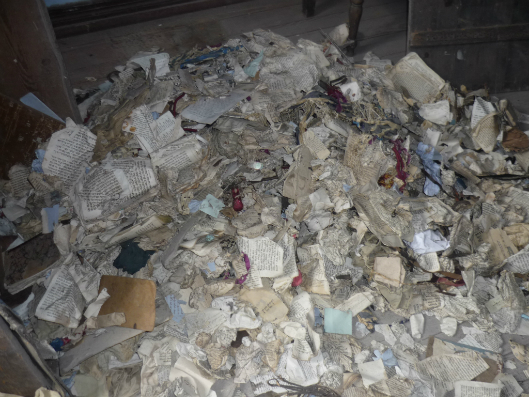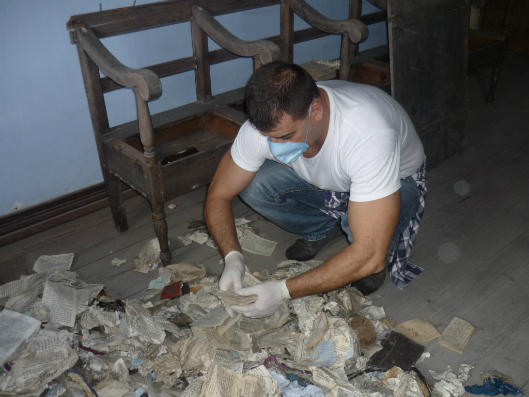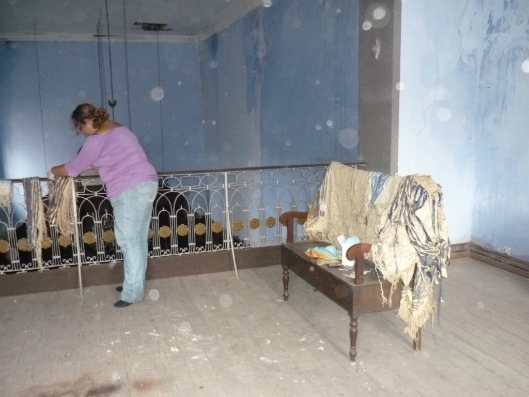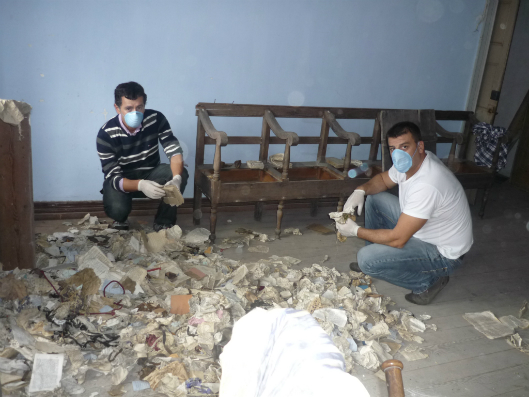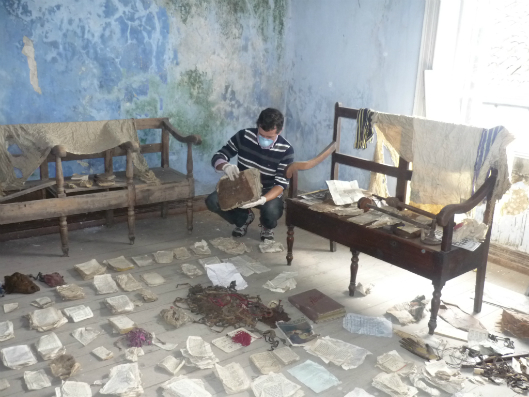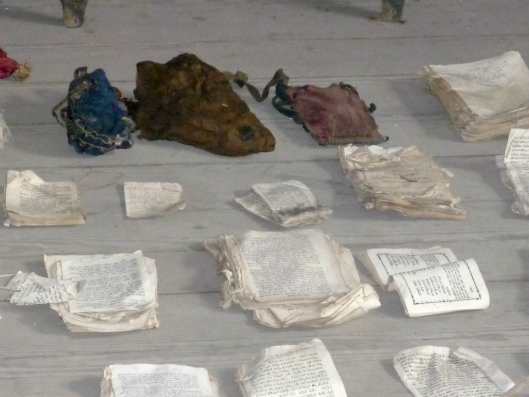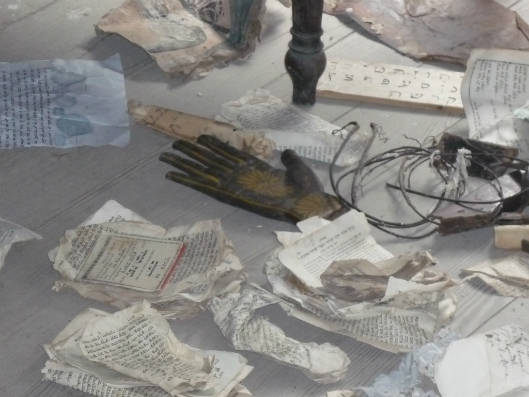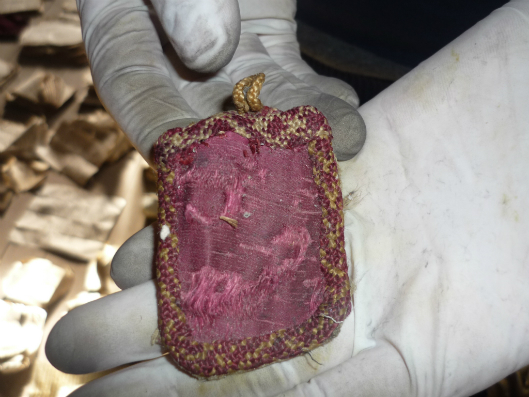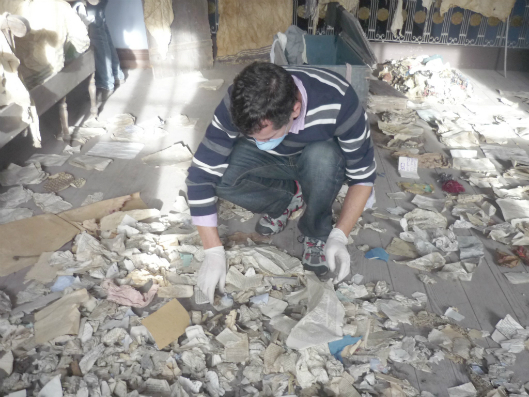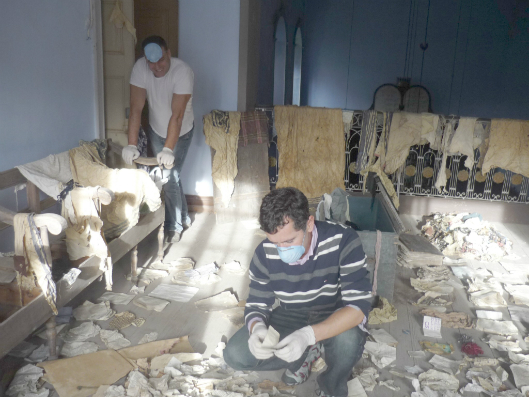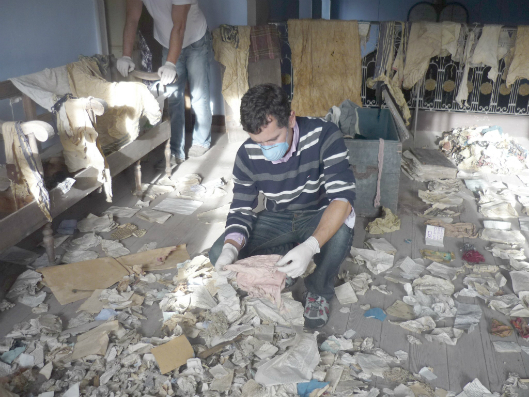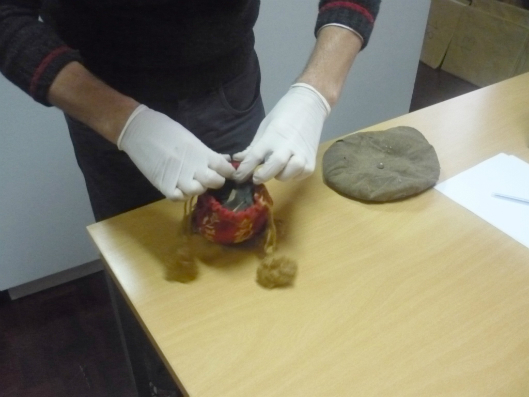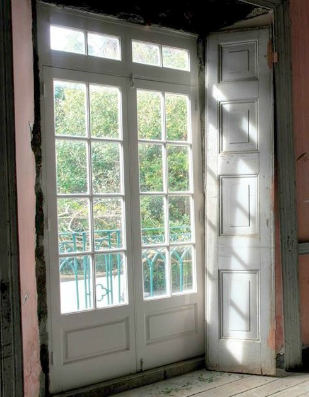Posted on 22 November 2013.
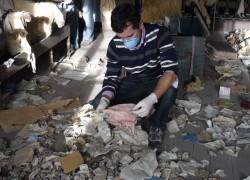 By Carolina Matos, Editor (*)
By Carolina Matos, Editor (*)
Historian José de Almeida Mello is the chief librarian of the Ponta Delgada Municipal Library and the cultural attaché of Ponta Delgada City Hall. In 2003, the Israeli Community of Lisbon appointed him the coordinator of the Azores Synagogue Restoration Committee to oversee the renovation and conservation project of the Sabar Hassamain Synagogue of Ponta Delgada.
The Sahar Hassamain Synagogue is the only surviving Synagogue on the islands and the oldest of Portugal’s remaining synagogues. It was established around 1820, by a group of Jewish entrepreneurs who migrated with their families from Morocco and settled on São Miguel island in the early 19th century.
At one point, the island of São Miguel was home to four synagogues in Ponta Delgada and one in Vila Franca do Campo. There was a Jewish cemetery in Ponta Delgada and four additional Jewish burial grounds: one on São Miguel, one on Terceira, one on Faial and one on Graciosa island.
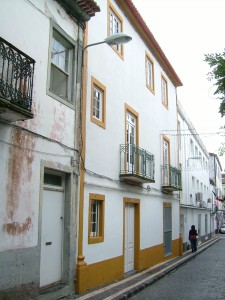
The Sahar Hassamain Synagogue in Ponta Delgada.
The Sabar Hassamain Synagogue was consecrated by Abraão Bensaúde in 1836, and abandoned in the 1950s after the last members of the resident Jewish community left the island. The last religious service in the Synagogue took place in 1966 with a group of Jewish soldiers stationed at the US Lajes Military Base on Terceira island, celebrating
Yom Kippur.
Provisionally owned by the Israeli Community of Lisbon, the building is in the process of transferring ownership to the Ponta Delgada City Hall to be renovated and turned into a public space.
The recovery project is the culmination of 30 years of efforts to save the Synagogue and preserve the Jewish legacy in the Azores. In the last 15 years, the Azores Synagogue Restoration Committee has been lobbying actively to advance the process. The undertaking has the support of the Ponta Delgada City Hall, the local community and the Israeli Community of Lisbon, together with the immigrant Azorean community and Harvard University in the United States.
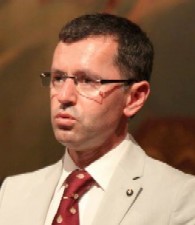
Historian José de Almeida Mello
José de Almeida Mello is a prolific author of many books and monographs. He published
Sahar Hassamain Synagogue in Ponta Delgada (2009) a book which tells the story of the Synagogue and speaks of the importance to preserve the Jewish legacy in the Azores.
In this interview for the
Portuguese American Journal, Mello describes the long process to save that legacy and speaks of those involved in the effort to place the Jewish experience in the Azores in context of history.
(See slide show)
What is known about the Jewish presence in the Azores?
We don’t have yet a comprehensive study relating to the Jewish presence in the Azores, but we know from various references that many Azoreans have Jewish ancestors. We know for a fact that, right after the Azores were discovered by the Portuguese in the 15
th century, many Jewish families settled on the islands. They were among the many being prosecuted by the Inquisition. How many they were and what happened to them afterward needs to be researched. One of the main goals of the Synagogue restoration project is to research the Jewish legacy in the Azores from the 15
th century to their most recent presence in the 19
th and 20
th centuries.
A Jewish community was established in the Azores after 1818. Who were they?
They were a group of industrialists and merchants from Morocco. They were of Sephardic origin and spoke Moroccan Arabic and Ladino. Family names included Bensaúde, Buzaglo, Aflalo, Amiel, Absdid, Zafrany, Abecassis, Adrahi, Benayon, Mataná, Semtob, Bensliman, Delmar, to name a few.
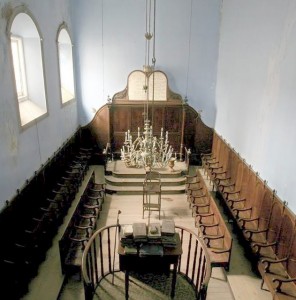
The Synagogue of Ponta Delgada was built indoors, inside a residence, concealed from public view.
How was the Jewish community received in the Azores?
I must say that they were not always welcome. Not on the basis of their faith but because they were shrewd merchants competing with the local commerce. As far as religion, at the time of their settlement there was a Constitutional law in Portugal which forbade the establishment of religious denominations other than the Catholic Church. This may explain why the Synagogue of Ponta Delgada was built indoors, inside a residence, concealed from public view.
However, between 1820 and 1826, Portugal went through the Liberal Revolution which granted religious freedom. After Liberalism was established, the Jewish community in Portugal, the Azores included, was allowed to worship in freedom. The same happened to other religious denominations, such as the Anglican Church, which was once concealed from public view and then enjoyed religious freedom after Liberalism.
The Jewish community expanded and thrived in the Azores for over a century, but has since disappeared. What happened?
The Jewish community in the Azores in the 19
th and 20
th centuries was a small one. Because the islands are geographically removed, progressively these Jewish families opted to resettle in mainland Portugal and other countries. Some intermarried and converted to Catholicism and assimilated into the mainstream society. Presently, only one individual in the Azores, Jorge Delmar Soares, claims to profess the Jewish faith. Nevertheless, descendants from those families still have a strong connection with the Azores. An example is the Bensaúde family, the owners of the Bensaúde Goup, founded in 1820, which still is the largest economic group in the Azores and one of the largest economic groups in Portugal.
How important is the Jewish legacy?
The Jewish presence remains a vivid part of the collective memory of both the Jewish community and the local community. In spite of being a small group, of about 200 individuals, they were very active on various islands where they established businesses, followed their traditions and practice their religion. They generated an enormous wealth and left an important cultural legacy. The Synagogue, the documents and artifacts left behind, together with the burial grounds, are relevant cultural references for the history of both the Jewish and the Azorean communities.
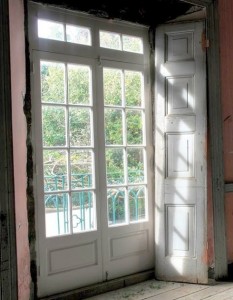
As a first step, the building received a new roof, new windows and doors and a fresh outside painting.
When and why did you get involved?
In 2000, during a trip to New Bedford to visit my grandmother, I was contacted by Alfredo Alves from Fall River. I didn’t know him and I had never heard of the Ponta Delgada Synagogue. I had just graduated from the University of the Azores, with a degree in History, and I was looking for my first job. In 1980, Alfredo Alves was a co-founder of the first group formed in the United States to recover the Synagogue. He expressed his frustration and concern with the state of neglect of the Synagogue and asked me to get involved. I told him I was in no position to help.
However, two weeks later, I landed my first job as the cultural attaché of the Ponta Delgada City Hall. One of my first actions was to visit the site. I was shocked with the state of decay I found and decided to take action. As a first step, I contacted the local media to raise public awareness for the situation. The next step was to get financial support to stabilize the decay process.
Thanks to the generosity of Dr. António Castro Freire, a member of the Bensaúde family, Christiane Frefrau von Schurbein, a German citizen residing in Ponta Delgada, and the Marques Group, a local construction company, the building received a new roof, new windows and doors and an outside painting.
For over 30 years several attempts were made to save the Synagogue and the Jewish legacy in the Azores. Who else was involved?
The first attempt was made in 1980 by an interfaith group formed in Fall River, Massachusetts. In 1988, the group created the Azores Synagogue Restoration Committee with the purpose of raising funds to recover the Synagogue. But their goal was never materialized. In 2003, after the Israeli Community of Lisbon got involved, a new group, an Azores Synagogue Restoration Committee, was formed in Ponta Delgada. I was appointed the coordinator of the committee in charge of the Synagogue recovery effort. Other members included Fátima Sequeira Dias, Jorge Delmar Soares, Isabel Albergaria, and António Bensaúde Castro Freire.
As a first step, the Azores Synagogue Restoration Committee initiated the process of transferring ownership of the building, from the Israeli Community of Lisbon, to the Ponta Delgada City Hall. As a result, in 2009 the City gained a 99-year concession over the building in exchange for providing funding for its renovation. As part of the recovery effort, in 2009 I published the book,
Sahar Hassamain Synagogue in Ponta Delgada, available in English and Portuguese.
In 2012, I co-founded the Associação Cultural Amigos da Sinagoga de Ponta Delgada with Jorge Delmar Soares and Nuno Bettencourt. We extended membership to about 115 individuals, at the local, national and international level, with the goal of securing a broad base of support for the Synagogue recovery effort. Also in 2012, the interfaith sister organization, Azorean-Jewish Heritage Foundation, was formed in Massachusetts presided over by Gideon Gradman, Treasurer Donald Berube, Secretary Lisa Rosen and directors Paula Raposa, Michael J. Rodrigues, Robert Waxler and Pedro Amaral. Their goal is to support the recovery effort through fundraising in the United States.
Why did it take so long to get organized around the recovery project?
For quite some time it was not clear who owned the building. As a result, there was the legal question concerning its ownership combined with a lack of leadership and political will. Only after the Israeli Community of Lisbon secured ownership of the building, was it possible to establish a partnership with the Ponta Delgada City Hall.
I must say that the impasse created a long period of neglect to which the public was not indifferent. Among those who voiced their concern and took action were journalist António Valdemar and historian Fátima Sequeira Dias. They kept the public informed and raised awareness for the historic relevance of the Jewish cultural legacy in the Azores and the importance to preserve it.
I was one of those individuals touched by their effort. At one point, I was so concerned that I decided to intervene on my own initiative. I spent countless days, many hours, inside the building cleaning, seeping, dusting, and sorting through trunks, boxes and trash. I collected and stored scores of items waiting to be studied and cataloged.
I also organized guided visits to the site with tourists, students and researchers. In 2010, I put together an exhibit at the Ponta Delgada Municipal Library displaying a variety of items found at the site with the goal of bringing awareness to the plight to save our Jewish cultural legacy.

Exhibit at the Ponta Delgada Municipal Library with the goal of bringing awareness to the plight to save the Jewish cultural legacy.
What did you learn about the site? What did you find there?
The Synagogue is concealed within the walls of a building situated on 16 Rua do Brum, downtown Ponta Delgada. From the outside, the building looks very much like any other Azorean 19
th century urban family dwelling. In the inside, the building served multi-purposes. It housed the Rabbi’s private quarters, a community center and the Synagogue. The community center offered art classes, Hebrew language classes and Torah classes. The Synagogue occupied a large rectangular area, well lighted by two windows facing north. This was the place where religious services, funeral rituals, marriages and circumcisions took place.
The space holds a strikingly beautiful Sanctuary with the Ark and podium and two rows of lateral chairs. Two trunks were found full of a mix of Hebrew manuscripts, books, garments and personal objects. Unfortunately, some furniture and woodwork have been contaminated with termites. The area has also been infested with mice, spiders, cockroaches and moths. At the request of Dr. Joshua Ruah, from the Israeli Community of Lisbon, some furniture and religious artifacts were removed temporarily, specifically the four Torahs, two ceremonial vases, the circumcision chair and two
chandeliers.
Your book, Sahar Hassamain Synagogue in Ponta Delgada, is a tell-all-book. Why did you write it?

I wrote the book at the time when many of us involved were feeling discouraged. The goal was to tell the Synagogue story, illustrate the state of decay of the building and call attention to the imminent danger of losing such a valuable cultural legacy. The launching of the book itself was an urgent SOS and my ultimate call for action. I was about to give up when the event took place on March 13, 2009, symbolically at the Hotel Marina Atlântico, owned by the Bensaúde Group.
At a meeting we had that day, I stated that I was ready to return the keys and walk away from the project if action was not taken. It was a turning point. I remember the very moment when a consensus was formed. It was six o’clock in the afternoon, when we all agreed that the Synagogue would be saved. It was an historic moment with all forces converging into the effort to move forward.
Soon after,
a meeting between the former City Mayor, Berta Cabral, and José Carp, the head of the Israeli Community of Lisbon, took place and a memorandum of understanding was drafted to transfer the ownership of the building from the Israeli Community of Lisbon to the Ponta Delgada City Hall. It was agreed that the City Hall would lead the recovery project with the goal of turning the Synagogue into a public space. Since then, we have made much progress. I must reiterate that the book was published free of charge, by the Nova Gráfica of Ponta Delgada, and that the proceeds will go to the Synagogue recovery fund.
What is the renovation project all about?
The main goal is to preserve the historic value of the common memory shared by both the Azorean community and the Jewish community. The plan is to recover the building, restore the Sanctuary and create a museum to preserve the cultural heritage found at the site. A center of interpretation of the Jewish legacy in the Azores will be created with a permanent exhibit, an archive, and a library including a private collection donated by Patricia Bensaúde. The site will become part of the cultural patrimony of the Ponta Delgada City Hall.
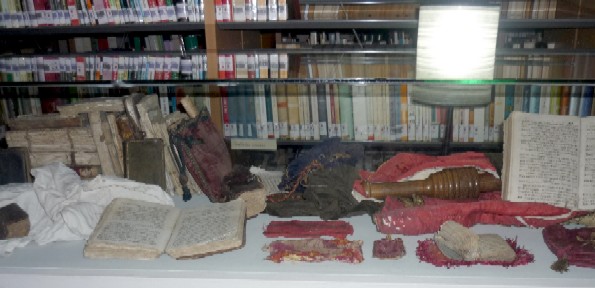
The main goal is to preserve the historic value of the common memory shared by both the Azorean community and the Jewish community.
How is the renovation project progressing?
The last tenants left the building in the 1950s. In 2003, after over 50 years of neglect, some maintenance work was done to stabilize the building. Currently, we are in the process of joining efforts with the two sister organizations formed in the Azores and the United States, together with public and private institutions in both countries.
In partnership with the Ponta Delgada City Hall and the Israeli Community of Lisbon, we are devising a recovery plan which will include fund raising, developing the museum concept, cataloging the inventory and rebuilding the site. The process has already begun and is progressing well. Fund raising is gaining moment. An Azorean architect, Igor França, has been working the details of the renovation project. Through the effort of Massachusetts Senator Michael Rodrigues, scholars of the Center for Jewish Studies, at Harvard University, have already committed to evaluate, identify, research and catalog the inventory.
When will the recovery project be completed?
Hopefully, if all goes according to plan, the project will be completed by the end of 2014 or sometime in the beginning of 2015. It will be a special occasion, a day of glory for all the friends of the Ponta Delgada Sahar Hassamain Synagogue
. It will be a memorable moment in our common history to honor and celebrate the Jewish cultural legacy in the Azores.
Who should be contacted for online donation related questions?
For information on how to contribute for the Sahar Hassamain Synagogue restoration fund donors may contact me directly at
josemello@lmpdelgada.pt or contact Pedro Amaral, at
pedro.amaral@masenate.gov., at the office of Massachusetts Senator Michael Rodrigues. Both Pedro Amaral and Senator Michael Rodrigues are group members of the Azorean Heritage Foundation and of the Amigos da Sinagoga de Ponta Delgada.
Will the Ponta Delgada Sahar Hassamain Synagogue become part of the newly created Sefarad Route project dedicated to reviving the Jewish historic sites in Portugal?
We are aware of the Sefarad Route project, launched in Portugal in partnership with Spain and a Norway-based group. The project has the mission to attracting tourists from the Jewish diaspora interested in visiting Jewish historic sites in Portugal. With the support of our partners, the Israeli Community of Lisbon, we certainly hope to include Ponta Delgada
in the network of cities with a Jewish presence in Portugal.
To watch the slide show, click on any thumbnail and than
click on Next or Back buttons.
Click on any picture to enlarge to full screen or to return to regular size.
Photos courtesy of Ponta Delgada Municipal Library
___________

(*)
Carolina Matos is the founder and editor of
Portuguese American Journal online. She was the Editor–in-Chief for
The Portuguese American Journal, in print, from 1985 to 1995. From 1995 to 2010, she was a consultant for Lisbon based
Luso-American Development Foundation (FLAD). She graduated with a
Bachelor’s Degree in Liberal Arts and a
Master’s Degree in English and Education from
Brown University and holds a
Doctorate in Education from
Lesley University.










